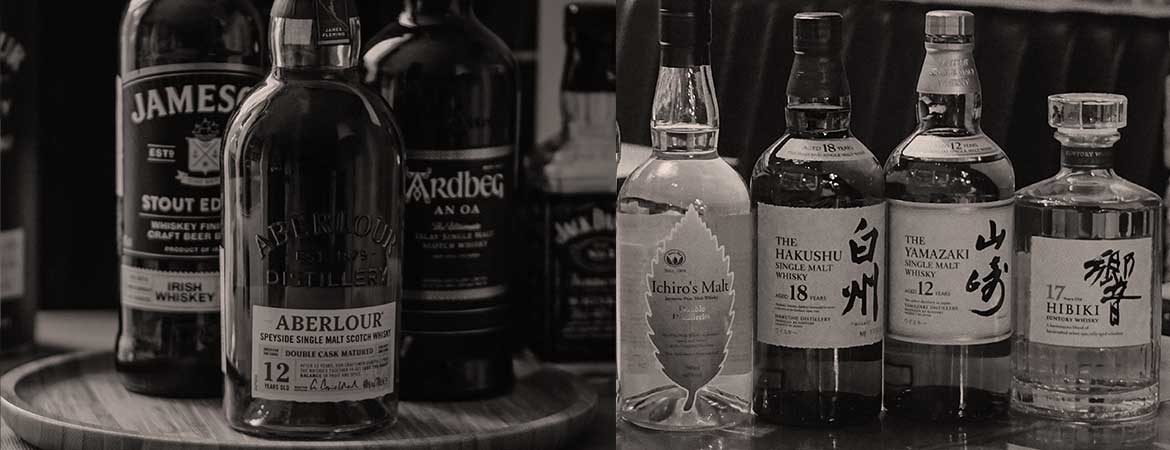Key Takeaways
Unique Production Processes: Japanese Whisky emphasizes low-pressure distillation for refined flavors. Scotch Whisky uses traditional methods, including peat, for a range from floral to peaty.
Geographic Significance: Japanese Whisky reflects its local culture and ingredients. Scotch Whisky, deeply rooted in Scottish tradition, showcases diverse regional flavors.
Flavor Profiles: Japanese Whisky is typically lighter with delicate, nuanced notes. Scotch Whisky varies widely, offering everything from light, floral to rich, smoky tastes.
Mash Bill Variations: Japanese Whisky mainly uses malted barley, sometimes with peat for added complexity. Scotch Whisky typically features malt-based blends, incorporating grain whiskies for a broader flavor spectrum.
Aging Processes: Japanese Whisky often ages in Mizunara oak, adding complexity. Scotch Whisky uses various casks like sherry and bourbon for diverse flavors.
Venn Diagramm: Japanese Whisky vs Scotch Whisky
What is Japanese Whisky?
Japanese Whisky, though inspired by Scotch, has carved its own identity in the whisky world. Distilleries in Japan, such as Suntory and Nikka, have been at the forefront of this movement. Unlike many Scottish distilleries, Japanese distilleries often produce both single malts and blends, showcasing their versatility.
The distillation process in Japan is influenced by a variety of factors, including the use of local ingredients and a wide variety of yeasts, which contribute to the distinct flavor profiles. Japanese distilleries also experiment with different types of casks, including the unique Mizunara oak, adding another layer of complexity to their whisky.
Characteristics of Japanese Whisky
Japanese Whisky is known for its elegance and precision, attributes highly valued in Japanese culture. Here are some key aspects:
Grain Ingredients: Primarily uses malted barley; some distilleries also use peated barley.
Distillation: Often involves low-pressure distillation, resulting in a smoother spirit with a lower boiling point.
Region Influence: Climate varies greatly across Japan, influencing the maturation process.
Aging Process: Utilizes a range of casks, including sherry, bourbon, and Mizunara oak.
Flavor Profile: Generally lighter and more delicate, with nuances of fruit, floral notes, and sometimes a hint of spice.
ABV: Typically around 40-43%.
Unique Practices: Some Japanese distilleries filter their whisky through bamboo.
Overview of Scotch Whisky:
Scotch Whisky, a revered and storied spirit, is whisky distilled and matured in Scotland, adhering to strict regulations. It is celebrated for its diversity, ranging from the smoky and peaty whiskies of Islay to the fruity and floral drams of the Highlands. Scotch Whisky must be distilled from malted barley and aged in oak barrels for at least three years.
The use of peat in some distilleries, especially in Islay, imparts a distinctive smoky flavor to the whisky. Blended Scotch Whisky, which combines malt and grain whiskies, is also a significant part of the Scotch Whisky market. Single malt Scotch whisky, made exclusively from malted barley at a single distillery, offers a distinct expression of its region, from the peaty Islay malts to the smooth Speyside varieties.
To explore the characteristics of Scotch Whisky, read our article Scotch vs Bourbon vs Whisky vs Whiskey, otherwise jump to our table that compares Scotch and Japanese Whisky.
Comparing Japanese Whisky and Scotch Whisky
Origin
Production Process
Key Ingredients
Aging Process
Flavor Profile
Distinct Qualities
Japanese Whisky
Japan; influenced by Scotch
Varied distillation, low pressure, diverse yeasts
Mainly malted barley, some peated
Mixed casks, including Mizunara oak
Light, delicate, fruity, floral, subtle spice
Precision, balance, innovative
Scotch Whisky
Scotland; deep historical roots
Pot still distillation, peated barley in some regions
Malted barley; blends mix malt and grain whiskies
Various casks, e.g., sherry, bourbon
Wide range; light to rich, floral to peaty, toffee, cinnamon
Diversity, depth, regional flavor spectrum
Sipping Preferences: Japanese Whisky vs Scotch Whisky
Personal taste preferences play a significant role in choosing between Scotch or Japanese Whisky. If you prefer a lighter, more refined flavor profile with delicate complexities, Japanese Whisky might be more appealing. Suntory’s Yamazaki or Hakushu are excellent examples, offering a nuanced sipping experience.
On the other hand, if you enjoy bold, rich flavors with a potential smoky undertone, Scotch Whisky could be more to your liking. The peated varieties from Islay provide a memorable tasting experience.
For those new to whisky trying a highball (a popular way to enjoy whisky in Japan) with Japanese Whisky or a Scotch with a splash of water could be a delightful introduction. We would also recommend tasting your Japanese or Scotch whisky neat to savour its flavor profile, or if you prefer chilled – on the rocks.
Final Thoughts on Japanese Whisky and Scotch Whisky
In the end, both Japanese Whisky and Scotch Whisky offer a fascinating journey into the world of whisky. Japanese Whisky, with its meticulous craftsmanship and innovative approach, has rightfully earned its place in the global whisky market. Scotch Whisky, with its rich heritage and diverse flavor spectrum, continues to be a benchmark for quality in the whisky industry. Regardless of your preference, exploring both types of whisky promises a rewarding experience for any whisky enthusiast
Frequently Asked Questions about Japanese Whisky and Scotch Whisky
Share on social media:









